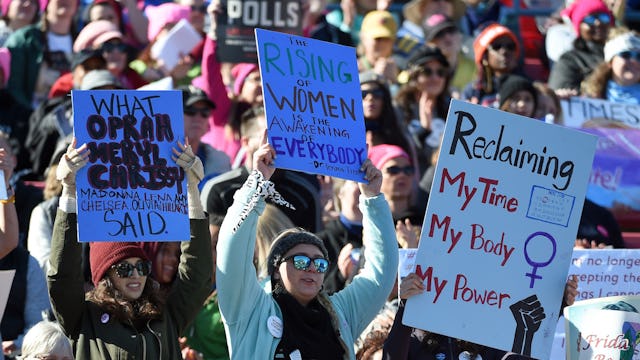The 'Violence Against Women' Act Expires Soon — Here's What's At Stake

Here’s what it will look like if the Violence Against Women Act expires Dec. 7
The last few weeks of news and testimony surrounding Brett Kavanaugh’s Supreme Court nomination have heartbreakingly echoed an era we, as a nation, should have moved past by now. In 1991, Anita Hill testified that Supreme Court nominee Clarence Thomas sexually harassed her, and Thomas was confirmed to the Court anyway. But after that came 1992, the “Year of the Woman,” when a record number of women won seats in Congress. And in 1994, the Violence Against Women Act was passed.
We can only hope that Christine Blasey Ford’s courageous fight against Kavanaugh will kick off similar progress for women — and a lot more seats in Congress being turned over to people who will fight for what’s right. But so far, that’s not the case — VAWA is set to expire December 7. Without action from Congress to extend the Act, women could face serious consequences.
VAWA was set up because lawmakers (especially all those newly elected women) realized that prosecuting sexually violent crimes takes different resources than other cases. Women need social support in order to come forward, undergo rape kits, face their abusers, testify, and other vital steps in that process. We’re seeing in the news today what women face when they come forward — Blasey Ford was literally mocked in public by the president yesterday, in addition to heaps of other ridicule and threats she’s already faced. Threats that have reportedly forced her out of her own home.
VAWA provides funding for things like rape crisis centers, shelters for victims of domestic violence, and legal support for women who decide to seek justice against their attackers. It funds some healthcare for victims, including therapy for survivors. In some states, it even funds special prosecuting units that are trained to handle the specific needs of sexual violence victims as they navigate the legal process.
And if the Violence Against Women Act expires, the funding for all those things goes away.
But it’s more than that. If the Act isn’t extended, lawmakers will be sending yet another clear message that they don’t care about preventing violence against women. If the Kavanaugh confirmation hearings have told us anything, it’s that. And those same lawmakers are now responsible for the future of this decades-old piece of legislation that is vital for the protection of all women.
Congress hasn’t acted in the best interest of women lately. It seems like wishful thinking to expect them to start now, but VAWA is too important for us not to fight. Call your representatives and urge them to act for women, for once.